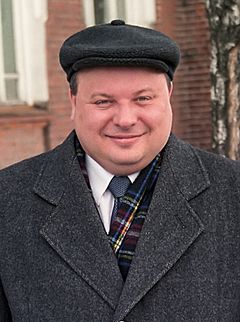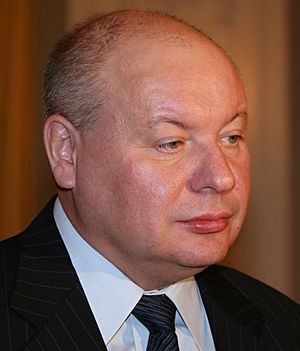Yegor Gaidar facts for kids
Quick facts for kids
Yegor Gaidar
Егор Гайдар |
|
|---|---|

Gaidar in 1999
|
|
| Prime Minister of Russia Acting |
|
| In office 15 June 1992 – 15 December 1992 |
|
| President | Boris Yeltsin |
| First Deputy | Vladimir Shumeyko |
| Preceded by | Boris Yeltsin (acting) |
| Succeeded by | Viktor Chernomyrdin |
| First Deputy Prime Minister of Russia | |
| In office 18 September 1993 – 20 January 1994 |
|
| Prime Minister | Viktor Chernomyrdin |
| In office 2 March 1992 – 15 December 1992 |
|
| President | Boris Yeltsin |
| Minister of Finance | |
| In office 11 November 1991 – 2 April 1992 |
|
| President | Boris Yeltsin |
| Preceded by | Igor Lazarev |
| Succeeded by | Vasily Barchuk |
| Personal details | |
| Born |
Yegor Timurovich Gaidar
19 March 1956 Moscow, Russian SFSR, Soviet Union |
| Died | 16 December 2009 (aged 53) Odintsovo, Russia |
| Political party | Union of Rightist Forces (2001–2008) |
| Other political affiliations |
CPSU (1980–1991) Democratic Choice (1994–2001) |
| Spouses | Irina Smirnova (div.) Maria Strugatskaya |
| Children | 3; including Maria |
| Alma mater | Lomonosov Moscow State University |
| Signature |  |
Yegor Timurovich Gaidar (Russian: Его́р Тиму́рович Гайда́р; pronounced [jɪˈɡor tʲɪˈmurəvʲɪtɕ ɡɐjˈdar]; 19 March 1956 – 16 December 2009) was a Soviet and Russian economist, politician, and author, and was the Acting Prime Minister of Russia from 15 June 1992 to 14 December 1992.
He was the architect of the controversial shock therapy reforms administered in Russia after the dissolution of the Soviet Union, which brought him both praise and harsh criticism. He participated in the preparation of the Belovezh Accords. Many Russians held him responsible for the economic hardships that plagued the country in the 1990s that resulted in mass poverty and hyperinflation among other things, although liberals praised him as a man who did what had to be done to save the country from complete collapse. Jeffrey Sachs, director of Columbia University's Earth Institute, who advised the Russian government in the early 1990s, called Gaidar "the intellectual leader of many of Russia's political and economic reforms" and "one of the few pivotal actors" of the period.
Gaidar died of pulmonary edema, provoked by myocardial ischemia on 16 December 2009.
Contents
Personal life
Gaidar was born in 1956 in Moscow, RSFSR, Soviet Union, the son of Ariadna Bazhova and Pravda military correspondent Timur Gaidar, who fought in the Bay of Pigs Invasion and was a friend of Raúl Castro. His paternal grandfather was Soviet writer Arkady Gaidar and his maternal grandfather was writer Pavel Bazhov. Despite the Turkic-sounding surname, Gaidar was Russian; his grandfather, originally called "Golikov", adopted the name "Gaidar" from the Khakas language as a nom-de-plume.
Gaidar married the daughter of writer Arkady Strugatsky during his time at the university. His daughter, Maria Gaidar, was one of the leaders of the Russian democratic opposition. From July 2009 till June 2011 she was Deputy Chair of the Government of Kirov oblast. In 2015 and 2016 she was vice-governor of Odessa Oblast in Ukraine.
Career
Gaidar graduated with honors from the Moscow State University, Faculty of Economics, in 1978 and worked as a researcher in several academic institutes. A long-time member of the Communist Party of the Soviet Union and an editor of the CPSU ideological journal Communist during the perestroika, he joined Boris Yeltsin's camp during Perestroika. In 1991 he quit the Communist Party and was promoted to Yeltsin's government.
While in government, Gaidar advocated free market economic reforms according to the principle of shock therapy. His best-known decision was to abolish price regulation by the state, which immediately resulted in a major increase in prices and amounted to officially authorizing a market economy in Russia. He also cut military procurement and industrial subsidies, and reduced the budget deficit. Gaidar was the First Vice-Premier of the Russian Government and Minister of Economics from 1991 until 1992, and Minister of Finance from February 1992 until April 1992.
He was appointed Acting Prime Minister under President Boris Yeltsin in 1992 from 15 June until 14 December, when the anti-Yeltsin Russian Congress of People's Deputies refused to confirm Gaidar in this position and Viktor Chernomyrdin was eventually chosen as a compromise figure. Gaidar continued to advise the new government. On 18 September 1993, he was again appointed the First Vice-Premier under Chernomyrdin as a deliberate snub to the opposition. He played an active role in the Russian constitutional crisis of 1993.
On 3 October, he famously spoke live on Russian television, then broadcasting from an emergency station near Moscow, as there was fighting going on in the Ostankino complex, calling on Muscovites to gather to defend Yeltsin's government so that Russia would not be "turned into an enormous concentration camp for decades".
In the 1993 Duma elections, in the aftermath of the crisis, Gaidar led the pro-government bloc Russia's Choice and was seen by some as a possible future Prime Minister. However, due to the bloc's failure to win the plurality of votes in the election, Gaidar's role in the government diminished and he finally resigned on 20 January 1994.
During the 1999 NATO bombing of Yugoslavia Yegor Gaidar, Boris Nemtsov and Boris Fyodorov were in Belgrade, Yugoslavia on a mediation mission.
Poisoning case
In November 2006 Gaidar went to Dublin, Ireland, to present his book Death of the Empire: Lessons for Modern Russia at an academic conference. Shortly after breakfast, a fruit salad and a cup of tea, Gaidar felt sick and returned from the conference hall to his room at the hotel. He was called on the phone to come down and deliver his speech, which Gaidar later recalled as a call that saved his life, as he would surely have died if he had been in his room unattended. After Gaidar had tried to deliver his speech he collapsed in the university hallway and was rushed to a local hospital. His colleague Ekaterina Genieva recalled that "He was lying on the floor unconscious. There was blood coming from his nose; he was vomiting blood. This went on for more than half an hour". Next day he moved from the hospital to the Russian embassy's premises and arranged a transfer to Moscow where doctors familiar with his health status suggested that it looked like he was 'poisoned'.
In an interview published in the FT, Gaidar claimed that it had been an attempted political murder, where "most likely that means that some obvious or hidden adversaries of the Russian authorities stand behind the scenes of this event, those who are interested in further radical deterioration of relations between Russia and the west".
Anatoly Chubais, another Russian reformist official and a former colleague of Gaidar, rejected the possibility of Kremlin involvement in this case, commenting that "Yegor Gaidar was on the verge of death on 24 November. The deadly triangle – Politkovskaya, Litvinenko and Gaidar – would have been very desirable for some people who are seeking an unconstitutional and forceful change of power in Russia."
Irish police opened an official investigation of the case. One of the versions voiced by the Russian opposition leaders and Kremlin supporters suggested that Boris Berezovsky, then a Russian oligarch in exile, may have been behind it. Andrey Illarionov, a former Putin adviser now living in the US, commented that the whole case was staged, and the reason for taking Gaidar to hospital must have been hyperthensia, stress or alcohol.
Death
Gaidar died at the age of 53 in Odintsovo raion, Moscow Oblast, Russia. Gaidar's aide Valery Natarov stated that Gaidar died unexpectedly, early on 16 December 2009, at his Moscow Oblast home while he was working on a book for children. Gaidar died of pulmonary edema, provoked by myocardial ischemia. He is survived by his wife, three sons and daughter.
Gaidar was regarded as an object of loathing among ordinary Russians who lost everything during the shock therapy economic reforms.
Exiled Russian oligarch Mikhail Khodorkovsky and convicted fraudster Platon Lebedev expressed their condolences. "He laid the foundation of our economy".
Russian President Dmitry Medvedev has expressed condolences to relatives and friends of Yegor Gaidar. Medvedev called Gaidar a "daring, honest and decisive" economist who "evoked respect among his supporters and opponents." "The death of Gaidar is a heavy loss for Russia," says Russian Prime Minister Vladimir Putin. "We have lost a genuine citizen and patriot, a strong spirited person, a talented scientist, writer and expert.... He didn't dodge responsibility and 'took the punch' in the most challenging situations with honor and courage," the statement said.
The White House offered condolences over Gaidar's death. U.S. National Security Council spokesman Mike Hammer said that, although controversial, Gaidar's legacy formed the foundation of a dynamic market-based economy.
Gaidar Forum
In honor of Yegor Gaidar, each year in mid-January the Russian Presidency holds the Gaidar Forum that attracts the Russian political and business elite, with top European politicians also attending. The Forum is organized the week before the World Economic Forum in Davos and thus also serves to formulate the Russian positions on a variety of topics.
Academic and political positions
Positions held
- Director of the Institute for Economy in Transition
- Executive Vice-President of the International Democratic Union (Conservative International)
- Steering Committee member "Arrabida Meetings" (Portugal)
- Member of the Baltic Sea Cooperation Council under the Prime-Minister of Sweden
- Member of the Editorial Board of "Vestnik Evropy" (Moscow)
- Member of the Advisory Board of the "Acta Oeconomica" (Budapest)
- Member of the Advisory Board of the CASE Foundation (Warsaw)
- Member of the International Advisory Board of the Moscow School of Management SKOLKOVO (Moscow)
Honorary positions
- Honorary Professor, University of California, Berkeley
- Terry Sanford Distinguished Lecturer, Duke University
- Honorary Academy member of the Ukrainian Academy of Management
- Honorary Director, Russia-Ukraine Institute for Personnel and Management
See also
 In Spanish: Yegor Gaidar para niños
In Spanish: Yegor Gaidar para niños
- Leszek Balcerowicz - architect of the shock therapy reforms in Poland.


